- Home
- William Shatner
Captain's Blood зпвш-8 Page 2
Captain's Blood зпвш-8 Read online
Page 2
“Time for lunch,” Kirk said. “Then lessons.”
Joseph held up a hand, three perfect fingers and one perfect thumb. “Two more rounds,” he pleaded.
Kirk smiled ruefully. The past few months, almost every conversation with his son had become a negotiation. The request for two more rounds was obviously meant to provoke a counter of one more round. Which was probably all that Joseph wanted, anyway.
But Kirk knew all about that kind of negotiating tactic. He had been taught by experts, and so, it seemed, had Joseph. “You’ve been spending too much time with your uncle Scotty,” Kirk said.
“Daa-ad.”
Kirk tried not to laugh. Joseph was looking deeply offended that his father would even think such a thing. “Hit the sonics. Then lunch.”
“And then two more rounds?” Joseph persisted.
Kirk smiled at his son, losing his battle but not the war. “Lessons, mister. Scoot!”
This time Joseph acquiesced gracefully—This time, Kirk thought—tossed Kirk his holographic bat’leth projector, then ran like an ungainly stork to the wooden ladder at the far side of the elliptical pit.
Kirk marveled that a child so uncoordinated in running could thrust and parry with his bat’leth so deftly. And his piano playing was already at the level of a skilled adult, though his math—usually a related skill—was lagging behind the average for even a five-year-old human. Joseph still didn’t have the faintest grasp of calculus, and without that rudimentary background, warp mechanics would be forever beyond him.
Kirk frowned even as he reached that dismal conclusion. His child was only five, and already he was placing the ultimate burden of expectation on him—a Starfleet career.
“I say this with respect,” Worf suddenly growled from behind Kirk, “but you should be ashamed of yourself.”
Kirk started. He had been so engrossed in watching Joseph clamber up the two-meter ladder to leave the pit that he hadn’t heard Worf approach.
“I beg your pardon?”
Worf, more imposing than ever in his combat-training garb of sueded burgundy leather, scowled as only a Klingon could. Despite his best effort to show deference to his guest, the disdain in his voice was impossible to disguise. “You let the child beat you.”
Kirk bristled. He, Joseph, and McCoy had been guests of the House of Martok for two weeks, and only now were the subtleties of Klingon etiquette coming into focus. Joseph was even developing a taste for gagh, though whether that was because the living worms actually tasted good to his Klingon taste buds, or because he was playing to his father’s unexpected squeamishness, Kirk could not be sure.
But even given the blunt directness of Klingon hospitality, Worf’s rude accusation surprised Kirk.
“Of course I let Joseph beat me,” Kirk said, trolling for more details.
But Worf only shook his heavy head, as if rendered speechless by disgust.
Kirk tried again. “I take it you don’t approve.”
“It is dishonest,” Worf thundered. “Such behavior gives the child a false sense of security. It teaches him that adults cannot be trusted. When the time comes to face true combat, he will fail.”
Kirk sighed, wiped the sweat from his forehead, and looked past Worf to find McCoy leaning on the wooden railing that surrounded the ceremonial pit. But his old friend paid no attention to Kirk and Worf. He was fiddling with a medical tricorder, no doubt reviewing his latest scans of Joseph. Since McCoy’s full retirement from Starfleet Medical, the study of Kirk’s child seemed to have become his new mission in life.
Still, another human ally was what Kirk needed now, to sort this out with Worf. He was here to help his child explore his Klingon heritage, but his own lessons in understanding Joseph were a challenge to him as well. Kirk started for the ladder closest to McCoy, reasonably certain that Worf would follow. And he did.
“He’s five years old, Worf. He won’t be facing true combat for—”
Worf cut off his explanations. “If you are serious about teaching your son his Klingon heritage, he should have already been blooded.”
Kirk paused with one hand on the ladder. There were some parts of parenting he had no doubts about. “I’ve also got his human, Romulan, and Vulcan heritage to work in there. He’s not going to be blooded. Not at age five.”
Worf growled again. Louder this time.
But Kirk merely handed him the holographic bat’leth projectors. Each unit was the size of a traditional bat’leth’s haft, with its three handgrip openings and leather wrappings. The actual twin batwing blades and spikes on each side were missing, to be created instead by small holoemitters and low-power forcefield generators. The projectors were a clever invention, enabling combatants to feel when an illusory blade had made contact, yet preventing the weapon from inflicting harm. Needless to say, the projectors were not a Klingon invention and Worf did not approve of them, either. But since even the wooden bat’leth s used by Klingon children could cause nasty cuts and bruises, Kirk had opted for safety over cultural purity.
Kirk stepped off the top of the ladder and walked along the railing toward McCoy. At ground level, all around him, the Martok estate was an explosion of dark purple summer-growth vegetation in more subtly differentiated hues than Kirk could identify. Wild targ roamed the forests to the east, in the midst of which stood the ancient ancestral castle of the House of Martok. It had a solid, imposing appearance, almost pyramidal, reminding Kirk strongly of the Great Hall housing the Klingon High Council. Why it was considered an ancestral castle, Kirk wasn’t certain. Less than a century ago, the House of Martok had wrested the castle from the House of Krant, which had wrested it in turn from the House of Fralk, which had rebuilt it after slaughtering the entire House of Tralkar, which originally had defeated the House of Fralk during an imperial inter-regnum four hundred years earlier, following the defeat of…The rest of the endless history was a blur to Kirk, who had tried to follow Worf’s recitation on the occasion of the first dinner held for Joseph. From that evening, he had retained little more than the impression that Klingon realestate transactions were extremely complicated, and often bloody.
“So what’s today’s diagnosis?” Kirk asked McCoy.
The doctor, simply clad in civilian trousers and a loose black shirt that looked suspiciously Vulcan in design, kept making adjustments to his medical tricorder and didn’t bother to look up. “For Joseph, or for you?”
Kirk leaned against the rough-hewn wooden railing that surrounded the combat pit. He heard the ladder creak as Worf climbed up. The sound made him rub his strained shoulder. “I already know what my diagnosis is. What about my son?”
McCoy slipped a thumb-sized, cylindrical plaser from a small pouch on his belt. For all that his snow white hair and narrow build made him look frail, his movements were sure, his hands steady. At one hundred fifty years of age, McCoy was reaching the upper limits of recorded human life spans, aided by internal skeletal actuators, synthetic organs, and his latest implant—an experimental, artificial mitochondrial biogenerator based on one of the remarkable subsystems built into the late Lieutenant Commander Data. In truth, Kirk thought a trifle grudgingly, his old friend looked better than he had in years, and his voice displayed no loss of gruff authority as he ordered Kirk to turn around.
“Joseph’s diagnosis is as close to textbook Romulan perfect as the tricorder can scan. For all that running around you were doing down there, his heart rate barely rose, but his blood-flow pattern went through a massive reconfiguration.”
Kirk flinched as he felt the plaser’s medical forcefields go to work on his shoulder, tightening stretched ligaments and loosening tight muscles. “Explain,” he said. A few years ago, he might have worried at the words “massive reconfiguration” being applied to Joseph, but he was used to it now.
“Blood flow to his muscles increased by twenty-three percent, shifting from less critical areas: intestines, both livers, and the secondary heart. How’s that?”
Kirk stretched
his arm over his head, turned back and forth. The pain in his shoulder was gone. He grinned. “Good as new. Thanks, Bones.”
McCoy made a sound halfway between a snort and a laugh. “You, my friend, are held together by spit and baling wire.”
Kirk stiffened. “What kind of bedside manner is that?” He was still in command of his faculties—or at least most of them, he told himself. The last thing he needed was someone else to remind him of his own mortality.
“I save that for patients who at least make an attempt to follow my medical advice.”
Kirk turned back to McCoy. “I make an attempt.”
McCoy rolled his eyes skeptically.
Kirk felt he might as well be having another conversation with his five-year-old. “You were saying about Joseph…” he prompted.
McCoy slapped his tricorder to his belt and the device hung there by molecular adhesion. “Jim, to be blunt, to be medical, your boy…that is, your child…is a hybrid. Genetically, hybrids can often tend to be stronger than their individual parents, their genetic makeup more robust. I can’t say for certain there aren’t more unusual growth spurts in his future, but my instincts tell me that Joseph’s physical development isn’t anything you or I should be worried about anymore.”
Kirk read between the lines, realized what McCoy wasn’t saying. “Then what should we be worried about?”
McCoy nodded to Worf as the Klingon joined them. “That other half of him,” the doctor said. “His mind, his spirit, what makes him human.”
“Or Klingon,” Worf said.
“Or Romulan or Vulcan,” Kirk added. “I know all this, Bones.”
Then McCoy surprised him by saying, “No, Jim, you don’t know.”
Kirk tapped his fingers on the wooden railing. If there was anything he disliked more than an argument, it was an argument he had had before.
“Bones, that’s the point of this exercise,” he said. “I can teach Joseph everything I know about his human heritage. But he’s more than that.” Kirk turned to Worf. “That’s why I’m relying on my friends to help him learn about everything he is. Where he came from. All the possibilities for what he might become.”
“Then you must stop letting him win,” Worf said.
“More important than that,” McCoy added, “you have to give Joseph some structure in his life.”
Worf nodded approvingly. “Discipline. That is the warrior’s way.”
Kirk rubbed at his face, knowing he shouldn’t get caught up in this discussion, but unable to remain silent. “He has structure.”
McCoy shook his head. “Because you make him take sonic showers and study the junior Academy-entrance curriculum? That’s not enough, Jim. Joseph needs a home base. He needs a stable community. A chance to make friends.”
“He has friends,” Kirk argued, defensive. “You, and Worf, and Spock, and Scotty and—”
“His own age,” McCoy said. “Worf’s right. Joseph shouldn’t be sparring with his father in a Klingon combat pit and winning just because he’s your son—or daughter. He should be wrestling with other children, climbing trees, getting dirt under his fingernails, scabs on his knees…being a child, and not…not a recruit in his father’s personal Starfleet Academy.”
Kirk felt anger grow in him as he listened to McCoy’s diatribe, and he could see that his friend saw that anger in his eyes.
“You asked for a diagnosis—there it is.”
A part of Kirk wanted to instantly discount everything McCoy had just said. But because it was McCoy who had said it, Kirk knew he couldn’t. Instead, he fought his resentment, tried to make McCoy truly understand.
“Bones…I don’t want to limit him.”
“Children need limits.” McCoy looked at Worf. “You’re a father. It’s the same for Klingons, isn’t it?”
Kirk felt the heat of Worf’s glare. “Yes. Limits provide security. Security provides confidence. Confidence provides courage. And courage is the key to surmounting all limits.”
Kirk looked up at Worf, unintimidated by his size or attitude. “I thought you didn’t get along with your son.”
Worf’s eyes narrowed, his nostrils flared, a predator about to attack. “We had…differences. Had I known then what I know now, perhaps those differences would not have been as…extreme.”
“Well, Joseph and I don’t have differences.” Kirk had the sudden feeling that if he were not an invited guest of the House of Martok, Worf would have already landed the first punch in a fight for honor.
“Fathers and sons always have differences,” McCoy said flatly.
“Other fathers. Other sons.” As far as Kirk was concerned, the unwanted and unwarranted discussion was over. “I’m going to have a shower. See you both at lunch.”
Worf grunted. McCoy frowned. And then all three men turned as one, Starfleet training to the fore, as they heard the first subtle tone of what could only be the carrier wave of an incoming transport.
The color signature of the familiar shimmer three meters away told Kirk it was a Starfleet beam, though the materialization—two figures, Kirk counted—was faster than he was used to seeing, as if Starfleet had achieved yet another incremental breakthrough in the technology.
Then, even before the effect had dissipated, Kirk recognized the new arrivals, and his first thought was that Worf might soon be in a better mood because of them.
Kirk stepped forward, hand extended. “Commander—” He stopped as he saw the pips on the visitor’s uniform. “Captain Riker.” Kirk shook Will Riker’s hand. “Jean-Luc told me the good news.” He smiled at Deanna Troi at Riker’s side. “All of it. Congratulations to you both. On your marriage, and your new command.”
But even then, Kirk felt a tightness in his chest, because the smiles and words of greeting Riker and his bride returned were forced and grim: the smiles of old friends with bad news.
Kirk glanced at Worf and McCoy, saw they sensed the somber mood of the visit as well.
“Is Captain Picard well?” Worf asked.
Jean-Luc’s well-being was the first thought that had come to Kirk, too.
“The captain is fine,” Riker said. But Deanna’s dark Betazoid eyes fixed intently on Kirk, and in the intensity of her gaze, in the knowledge that it was onto his emotional mood she focused her empathic powers, Kirk tensed, suspecting that Jean-Luc was not the reason for this unexpected visit.
Kirk suddenly knew the worst.
“Spock,” he said quietly.
Riker nodded, and Kirk felt the gravity of Qo’noS shift beneath him, as if all the stars had been wrenched from the heavens.
As if something within him, too, had died.
2
U.S.S. TITAN, STARDATE 57471.1
It had been more than a year since Kirk had been on a Starfleet vessel, but he scarcely registered the difference between the artificial gravity of Riker’s Titan and the natural heavy pull of Qo’noS. The starship’s cool air tinged with the faint crisp scent of warm isolinear circuitry, the almost soothing hum of atmospheric circulators and scrubbers, the rushing pulse of water and coolant through hidden conduits; all the sensations of the mighty ship washed around Kirk without his notice.
He stood alone, his mind and being still in turmoil. How many times had he thought he had lost Spock? How many times had he thought the adventure of his own life was over? And always there had been a way back, the unseen chance, a…possibility.
Until now.
He stared at the image frozen on the main viewscreen in the Titan’s darkened ready room. The coliseum on Romulus. The first to be built there uncounted centuries ago.
The flash from the explosion glowed through the rows of arched windows. That flash was the last thing Spock had experienced—seen, felt, known.
It had been a chemical explosive, or so the local Compliance Division had determined. Simple, primitive, deadly. No telltale radiation or antimatter signature to set off the security alarms. Triggered by a mechanical timekeeping device—again, no anomalous energy
readings to raise suspicion.
The device had been placed under the elegantly carved stone podium from which Spock had addressed his audience. There were visual sensor logs of his speech—his impassioned plea—which had been transmitted live for other interested parties on Romulus, and recorded for eventual transmission over subspace information channels to Vulcan.
“It is not a question of logic,” Spock had said in the final moments of his life. “It is not a question of emotion. It is a question that can be answered only by the blending of the two. Emotion and logic. Romulan and Vulcan. Two halves of a single entity that has too long been sundered.”
Then Spock had paused to look around at his audience. He had taken a sip of water from a slender cup. And then the nature of what he said subtly changed, became more personal, and Kirk couldn’t help but wonder if in some way Spock had known the next words he spoke would be his last.
“There is rest enough for the individual being, too much and too soon, and we call it death. But for our people, Romulan and Reman and Vulcan, and all who will stand with us, there can be no rest and no ending.
“Only together can we then go on, frontier after frontier. First the stars, and then all the laws of mind and matter that restrain us.
“And when, together, we have achieved understanding of all of deep space and all the mysteries of time, still we will be beginning.
“Together.
“Unified.
“Or—”
There the record ended.
The penultimate, still image of this recording haunted Kirk: Spock, holding one outstretched hand to his audience, reaching out to all the worlds of the Star Empire and Vulcan’s myriad independent colonies, as the first yellow-orange glow of the bomb’s detonation shone up from beneath him.

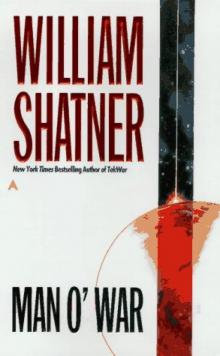 Man O' War
Man O' War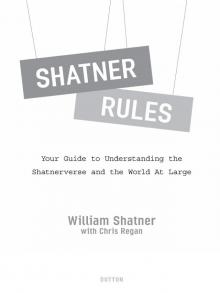 Shatner Rules
Shatner Rules Leonard
Leonard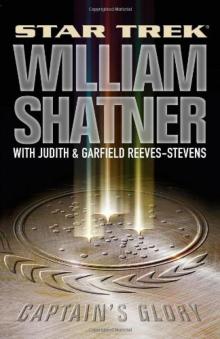 Captain's Glory
Captain's Glory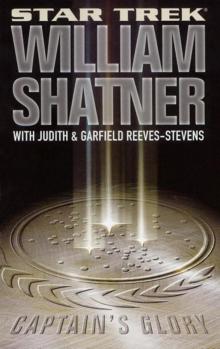 Captain's Glory зпвш-9
Captain's Glory зпвш-9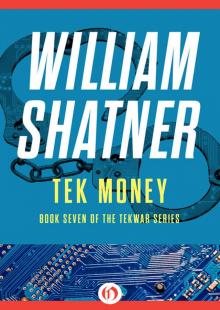 Tek Money
Tek Money Spirit of the Horse
Spirit of the Horse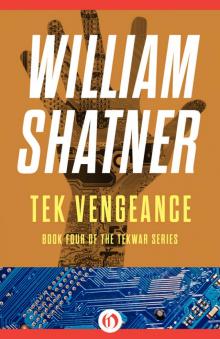 Tek Vengeance
Tek Vengeance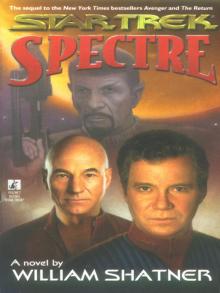 Spectre
Spectre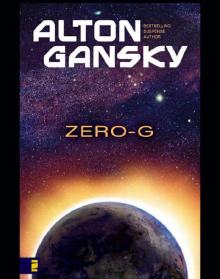 Zero-G
Zero-G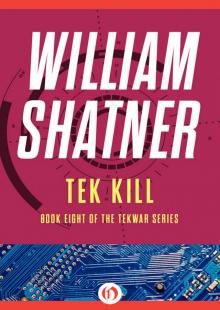 Tek Kill
Tek Kill Collision Course
Collision Course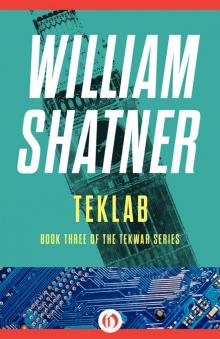 TekLab
TekLab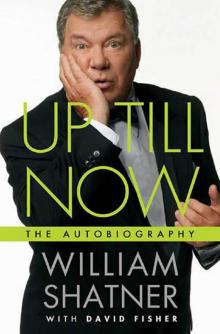 Up Till Now
Up Till Now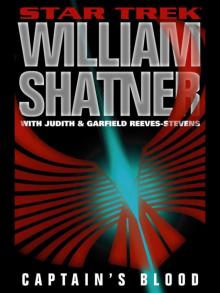 Captain's Blood
Captain's Blood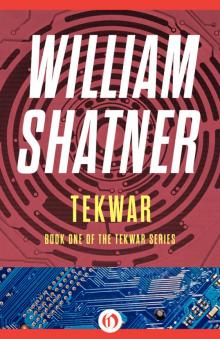 TekWar
TekWar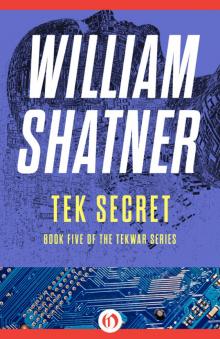 Tek Secret
Tek Secret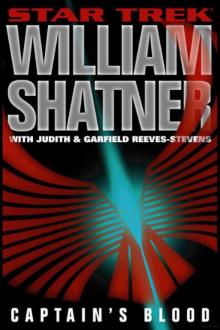 Captain's Blood зпвш-8
Captain's Blood зпвш-8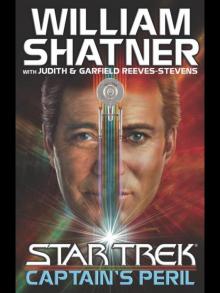 Captain's Peril
Captain's Peril Live Long and . . .
Live Long and . . .